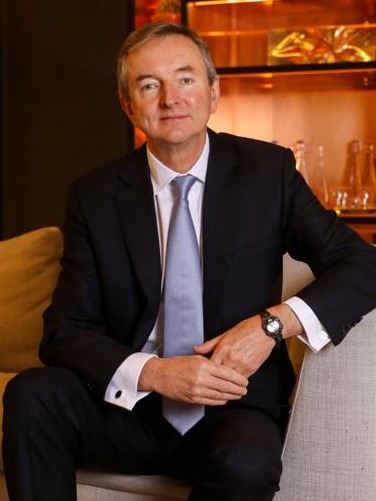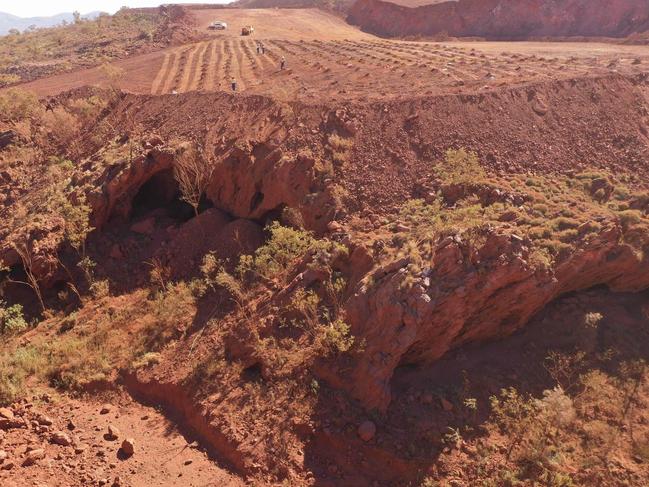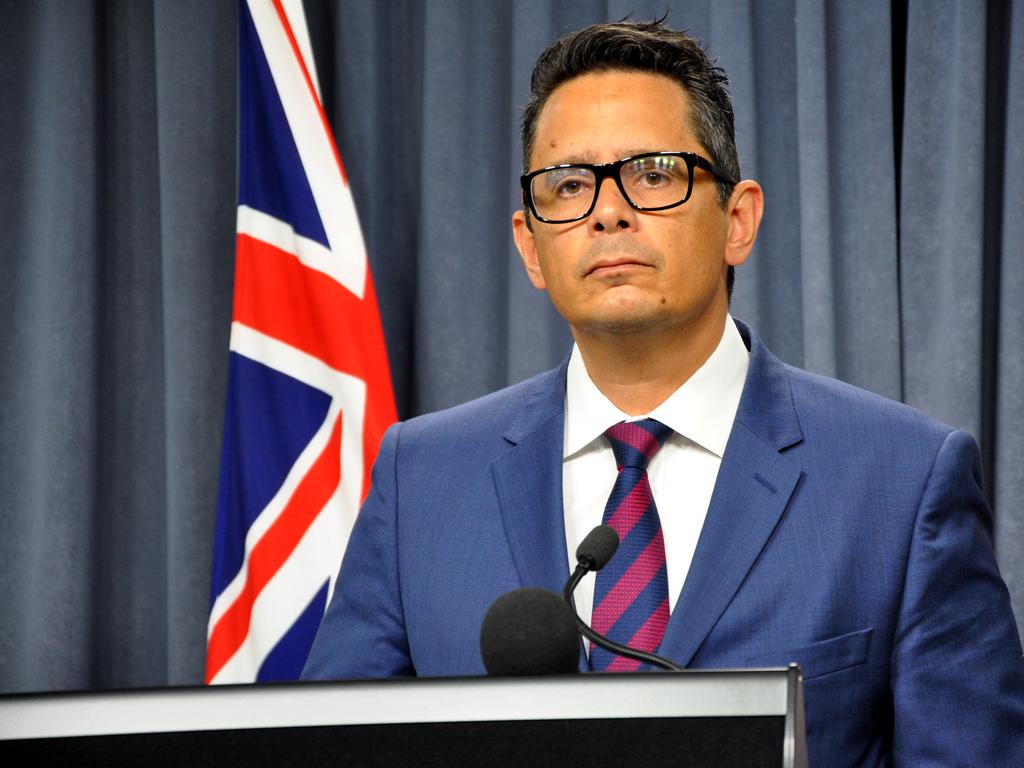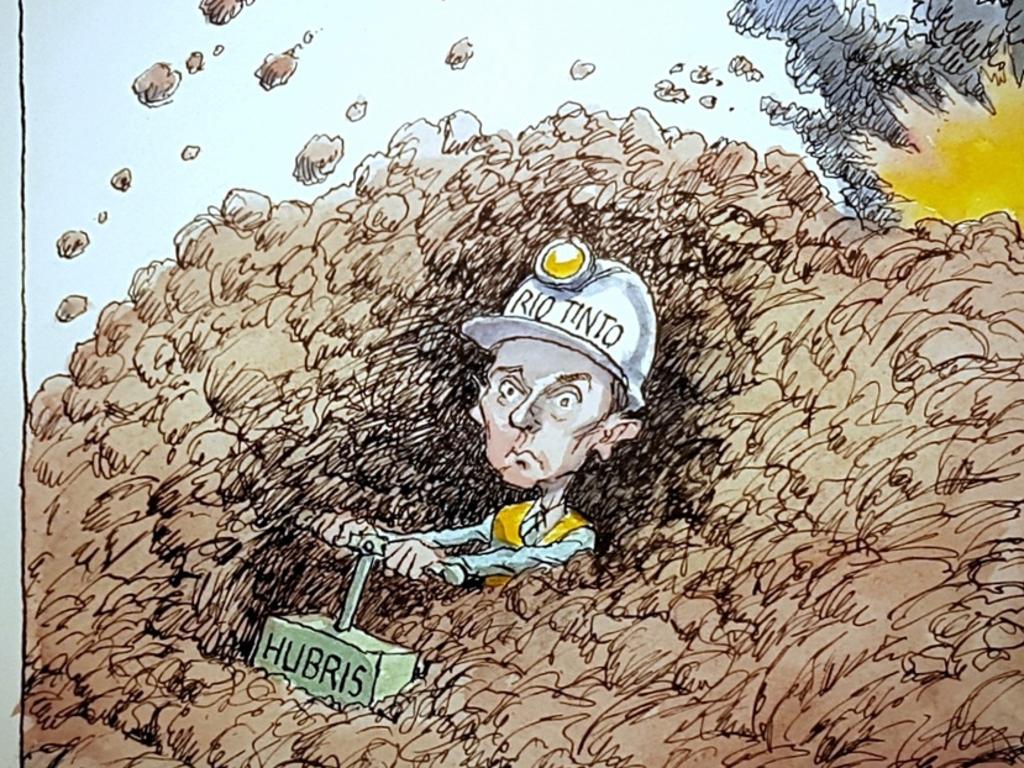Behind the revolt that finally led Rio Tinto to cave in
It took two weeks for Rio Tinto’s board to come to the conclusion the public had reached months ago: chief executive Jean-Sébastien Jacques must go.

It took two weeks — as Rio Tinto directors dialled in to a procession of video meetings on the latest outrage from investors around the world — for the mining giant’s board to come to the conclusion the public had reached months ago: chief executive Jean-Sébastien Jacques must go.
Rio’s Australian directors Simon McKeon and Megan Clark had seen the writing on the wall early, as outrage over the company’s destruction of the ancient Juukan Gorge caves in the Pilbara failed to abate.
London-based directors Simon Henry and Sam Laidlaw had also realised the damage the crisis was doing to the brands of both the company and its directors.
And Jacques himself, as he met with Indigenous groups in Perth and the Pilbara in a last-ditch effort to save his job, had realised that the momentum of public, government and investor anger against the mining giant would not abate for as long as he remained at the helm. The terms of Jacques’ departure were signed off just before midnight on Thursday, London time, minutes before the miner announced that the charismatic Frenchman, his iron ore boss Chris Salisbury and his corporate affairs head Simone Niven would leave the company.
Rio’s chairman Simon Thompson, who had believed the company’s strong performance and distance between the Pilbara and financial markets would be enough to save his chief executive, had also finally realised — after meeting 75 major investors in less than a month — that displeasure among shareholders was too widespread to ignore.
For decades, the power base of mining giant Rio Tinto has drifted towards London. It has taken a very Australian disaster, and a very Australian institutional investor revolt, to bring that to an end. Australian fund managers had watched Rio lurch from disaster to disaster in the four months since the company detonated the caves in Political and community outrage kept growing, and every cack-handed attempt by Rio’s management at placation merely gave the story fresh legs.
The company’s internal board report into Juukan Gorge, released on August 24, and Thompson’s public statement that the only sins Rio’s management committed were ones of “omission, not commission”, were the final straws. But when Australian shareholders demanded further action in the days after the release of the internal review, they were met with a blunt message.

Australians only hold 20 per cent of Rio stock, and the feeling was if outrage was only coming from Australian shores, then Rio could weather the storm.
It is a sign of the arrogance of the Rio board that they thought that, in the modern age, the outrage wouldn’t spread beyond Australian shores.
While analysts who follow the details of Rio’s operations had been growing more concerned at its procession of problems and Jacques’ inability to connect with an Australian audience had grown ever more stark, Rio still believed international investors had been pacified by the steady flood of cash flowing from iron ore’s second boom and Jacques’ adroit exit from coal.
But Rio’s blunt response to Australian shareholders promoted fund managers to go public. AustralianSuper — Rio’s biggest local shareholder — was the first to do so, putting out a statement on August 26 saying “the proposed penalties fall significantly short of appropriate accountability for those responsible”.
That statement, followed quickly by similar comments from other Australian funds, triggered first a trickle, then a flood of queries from offshore investors who had noted the ructions over the destruction of Juukan Gorge, but had not necessarily fully appreciated its significance.
In the weeks after the release of the company’s internal review, Thompson held dozens of meetings with investors. With each, it became clearer that he had no choice but to sack the executives he had so publicly defended just weeks earlier.
Investors’ concerns were not just about the destruction of the heritage site. Governance issues dominated the questions being fired in by overseas shareholders.
Rio’s limp response to the failings of its most senior management to spot the problem ahead of time and avoid it, and attempts by its team to play the issue down in overseas markets, raised the question — in the words of one investor who spoke on condition of anonymity — “what else we might have to pretend to ignore in the future”.
The gathering storm came to a head last week, with a strategic leak to the Daily Mail and other British newspapers pointing to boardroom division over the issue. It’s not clear whether the leak was a symptom of genuine divisions, a public strike designed to force Thompson’s hand, or just a bit of back-channel backside-covering by board members finally aware they had a personal reputational problem.
The leak helped break Rio’s levee and, as other investor groups piled on the pressure, its board spent the week in a frenzy of discussions and negotiations designed to find a graceful way out of the hole they had dug.
Ultimately, not even God could save Jacques. The Church of England on Wednesday went public with its concerns about the company and its leaders, adding to a growing chorus of influential investors and prominent voices who believed the company had failed not just in the destruction of the caves but also through its subsequent lack of accountability.
Up to that point, Rio was still running the message — to the few still listening — that shareholder anger was largely still confined to Australian finds.

But the public comments by the church — traditionally the lead voice in the coalition of investors that have successfully pressured Rio and major miners over climate change and tailings dam safety — made it clear the condemnation had spread far beyond Australia. From then it was simply about sorting out the departure details.
The final agreement was thrashed out on Friday morning, according to the Rio chairman, with the details announced to the market as soon as the market platforms allowed.
One of the many problems facing the Rio board in taking decisive action was its failure to plan for alternative successors to Jacques. When appointing the Frenchman to the top job, then-chairman Jan du Plessis said he’d be the boss for the next decade.
The current board was clearly never strong enough to force their chief executive to promote the next level of talent that would one day challenge him for the top job. With no clear internal candidate to replace Jacques, the board was faced with the issue of how to lever him out.
Rio’s lawyers will also have done well out of the week — you can’t sack people when your own internal review cleared them of any direct blame and not expect a lawsuit.
The trio of Salisbury, Niven and Jacques were going to have to be allowed to go on their own terms, or something close to it. The awkward compromise — to leave Jacques in place for the next six months, while Salisbury and Niven exited before him, but were paid until the end of the year and with their long term incentives intact — was the only real solution.
By Tuesday, as Jacques finally sat down with representatives of the PKKP, the shape of the compromise was emerging and Rio was telling major shareholders their concerns would be addressed by the end of the week.





To join the conversation, please log in. Don't have an account? Register
Join the conversation, you are commenting as Logout